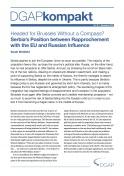This text continues a series of articles edited by Stefan Meister exploring Russia’s use of instruments of "hybrid warfare" since the Ukraine crisis and the annexation of Crimea.
Russia’s annexation of Crimea and the war in parts of Ukraine pose a fundamental challenge to European order. For the first time since the end of the Cold War, two models are vying openly for supremacy. This focuses attention on the countries of the Western Balkans. Democratically unconsolidated, economically weak, and with no immediate prospects of being admitted to the EU, the nations in this region are susceptible to external influence. In November 2014, it was with comparative frankness that German chancellor Angela Merkel voiced her concern that Russia might pursue its expansion policy into the Western Balkans: “This isn’t just about Ukraine; it’s also about Moldova, and about Georgia, and if it continues like this … we will have to ask about Serbia – we will have to ask about the West Balkan states."
It is no coincidence that Merkel singled out Serbia in the line-up of states from the Western Balkans. Large parts of the country’s population and its political elite regard Russia as a natural ally and protecting power, and good relations with Moscow are part of the government’s foreign policy directive. At the same time, however, Serbia is clearly oriented toward the EU. All the important political parties and the population favor their country becoming a member state. This balancing act between EU rapprochement on the one hand and traditionally close relations with Russia on the other posed no problems as long as Brussels and Moscow enjoyed cooperative relations and Serbia was not required to make any stark choice between the two. In the increasingly antagonistic European order, however, Serbia’s pro-Russian politics will inevitably lead to tension with the EU. The direction Serbia decides to take is of major significance, not only for the country itself, but also for the stability of Europe.
Read the entire article here.
